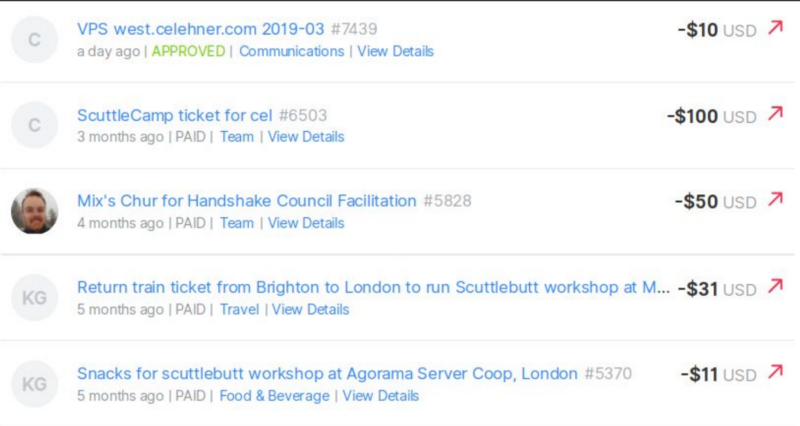Enriching commons by practicing with money
For the Secure Scuttlebutt community, it involves money but it’s not about money

How the Secure Scuttlebutt community is growing peer relationships through funding each other
Secure Scuttlebutt (SSB) is a P2P decentralized gossip protocol (‘scuttlebutt’ is sea slang for gossip). That means, instead of sending data through a central server owned by a third party, your device connects directly to your friends’ and ‘gossips’, updating both of your local databases. You own your own data and everything is cryptographically secured. The main SSB use case so far is social networking, giving rise to a vibrant community building and using the protocol.

Their philosophy of decentralization also extends to money. Several grants have resourced the SSB ecosystem, and the community has intentionally taken a different approach for each, in order to spread out power and learn iteratively. These range from setting bounties for specific pieces of work, to forming a council that developed a detailed budget plan, to granting $5,000 to any project approved by a monthly rotating ‘adjudicator’.
Another such financial experiment is the Secure Scuttlebutt Consortium Open Collective, mainly funded through small regular contributions by contributors around the world. Core contributor mix irving recently posted an invocation (a call for something you want to see more of in the world) explaining why funding through their Collective is so powerful.
If you are on Scuttlebutt, you can see the original post using this cypherlink: %sW3EmoeHwPbg5OCQQLI1x6tTSzEQc/nClDXjfbHSA+w=.sha256.
Mix’s Invocation

This is a game I’d like to invite you all to play with me. It’s really important, strategic, and — crucially — fun. I want to prepare the ground for this invocation by sharing some history of this game and how I’ve seen it unfold in the past.
Cobudgeting
The story normally starts with a collective (like a co-working space or a community of facilitators) that is aware it would like to be distribute power and decision-making. There are many ways to do this, but doing this with money is especially potent — despite being made up, it’s surprisingly concrete and moving it changes how people feel.
So the group has some money in the middle (say $20 of their desk rent goes there, or part of what they invoice, or it’s been set aside by the organisation), and with a tool like Cobudget people can put up projects, and each person is given, say, $50 to allocate across those projects. The funded ones go ahead.
This sounds like crowdfunding, but it’s actually quite different:
- the money you’re allocating is not yours, it’s the group’s
- you aren’t buying things for yourself, but for the commons
What Cobudgeting does to people
The first phase of Cobudgeting is pretty banal. Someone in the co-working space puts up a project, like “Buy a new Espresso Machine”. The second phase of Cobudgeting is where people start thinking about intangible things that could be funded and start to push boundaries. Here’s the magic part.
“Hey, would the collective pay for my ticket to this conference?”
“Tell us more about it; how does that benefit the commons?”
“Oh, it’s with that crew we’ve been wanting to build bridges with, and this could be a scouting mission or an emissary!”
Other examples include things like facilitating a documentation drive, hosting a workshop on an interesting topic, offering counselling services, or help writing blog posts (more Cobudget case studies here).
It’s a very simple, very powerful, virtuous cycle:
- Someone senses/dreams a new possibility
- We practice thinking as a group about what we do /don’t resource
- We learn something (a new domain, new person, or new process)
- We celebrate (successes + failures, because they both make the next round richer)
- We go again
What emerges is something like the growth of capacity for governance, by which I mean strategy, accountability, and policy.
We’re already playing!
We’ve been playing with quests and resourcing for a couple of years now, more recently with several grants. We’ve been experimenting with how we run the processes each time. There have been successes and failures, and we’ve learnt more about ourselves: our values, our similarities, and our differences. And through this, we’ve built stronger relationships.
IT IS NOT ABOUT MONEY
Money has a lot of baggage, and in many activist spaces there’s a taboo about talking about or engaging with money. I want you to very clearly understand: while I’ve been telling a story which involves money, money is not the core focus.
Money is a tool. When used carefully, it can facilitate much more important things, like: sensing, dreaming, figuring out our individual + collective values, learning how to hold constructive conflict, growing deeper relationships, which can resource bigger quests, enabling learning, celebrating together.
It involves money, but it is not about money.
Recently a community member who is a Mozilla Fellow offered to help people apply. I asked them if they’d be open to receiving a koha (donation) from our Open Collective funds to acknowledge that labour. Initially they weren’t keen, saying “I’m already being paid by the fellowship”. I persisted, arguing that I’d like him to take $50 because it communicates that we value strategic support to work on the commons, and we want to celebrate his initiative.
Say it with me: IT IS NOT ABOUT MONEY
The Invocation
Let’s play. Let’s dream and sense and talk about about what and how we want to exist. Let’s use the Open Collective (and other resources) to feel into possibilities and grow our relationships.

People have already started, but now let’s all play more. One person has been doing amazing work hosting crucial infrastructure for this community. Another has hosted workshops and made sure attendees were nourished. Another took on the huge role of guiding a grant council into being — $50 on this front is almost a joke… perhaps it should be $250?
You can see what’s been funded already in our Collective’s transparent budget.
Let us enrich the soil of our commons. Let us cheer each other on and document our learning. Let us have fun. Let us grow.
Join Mix in the decentralized web by getting on Scuttlebutt.

